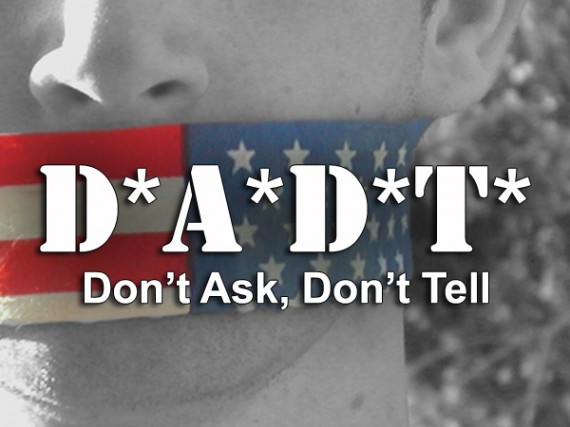Don’t Ask Don’t Tell Comes To An End
Mostly quietly, the military’s 18 year-old policy barring gays and lesbians from serving openly in the military has come to an end:
The U.S. military has spent months preparing for the repeal, updating regulations and training to reflect the impending change, and the Pentagon has already begun accepting applications from openly gay men and women.
The historic shift follows years of battle and debate over the “don’t ask, don’t tell” policy, also referred to as “DADT.” When it was signed by President Clinton in 1993, the policy was hailed by proponents for extending protection to gays and lesbians serving their country. Under the law, commanders were not allowed to ask about someone’s sexual orientation, and gays and lesbians were expected to keep their orientation under wraps.
But as gays and lesbians continued to fight for equal rights in other areas of society, the “don’t ask, don’t tell” policy grew to become a painful reminder that those in the military still had to hide their sexual orientation. Moreover, gays and lesbians who were open about their sexual orientation — or who were outed — faced punishment and expulsion.
Such punishments and expulsions will now stop. And the repeal ends any pending investigations or inquiries.
The original drive to lift the ban, and later the DADT policy, pitted those fighting to recognize the service of gay servicemen and women against those who feared it would disrupt the service’s sense of order and undermine critical military relationships.
President Obama signed the law that repealed “don’t ask, don’t tell” and officially certified this summer that it would not diminish military readiness. But plenty of opposition still remains.”It’s a tragic day for America,” said Peter Sprigg of the Family Research Council.
While gays and lesbians can now serve openly, there are still limits: All servicemen and women — regardless of sexual orientation — must continue to abide by strict standards of personal conduct, such as those pertaining to public displays of affection.
Despite the paranoid warnings of social conservatives, there’s been no sign in the months since the law was passed that there was going to be any chaos or disruption in the ranks from the changed policy. In fact, a new Army Times survey finds quite the opposite:
The 2011 edition of the annual Military Times Poll shows that more than 61 percent of the 1,019 active-duty respondents believe repeal will have little or no effect on their day-to-day operations and missions, while just 12 percent think repeal will have a major impact.
Similarly, 57 percent said repeal will have no affect on them as individuals.
The percentage of service members who support allowing gays to serve openly also reached its highest level in all services since the Military Times Poll began asking the question.
In the 2011 poll, 56 percent of sailors said they support repeal of “don’t ask, don’t tell,” along with almost half of soldiers and airmen. Even among Marines, traditionally the most staunchly opposed to open service by gays, 37 percent said they support repeal — more than twice the percentage in the 2006 poll
While this doesn’t appear to be an entirely traditional poll, it mirrors other surveys that show that the opposition to the policy is shrinking, More likely than not, the experience in the United States will be little different from that in other nations that have allowed gays to serve openly. These are men and woman who are accustomed to following orders, and they’ll accept this one even with the adjustments it might require. Besides, it was the right thing to do.
UPDATE (James Joyner): Agreed all around with one important caveat: DADT didn’t create the rule banning gays from serving; instead, it ended the policy of asking recruits whether they were gay. Until today, we’ve always banned homosexuals from serving. What changed in 1992 was that gays were officially allowed to serve so long as they didn’t tell anyone about it or otherwise make it obvious. Whether that was an improvement over the old policy is debatable.







It will be interesting to see how the Christian right handles this.
Will their love of the U.S. military force them to end their anti-gay ways now?
What a drag for conservatives. How will they go about ruining lives now?
Have our forces in the field surrendered yet?